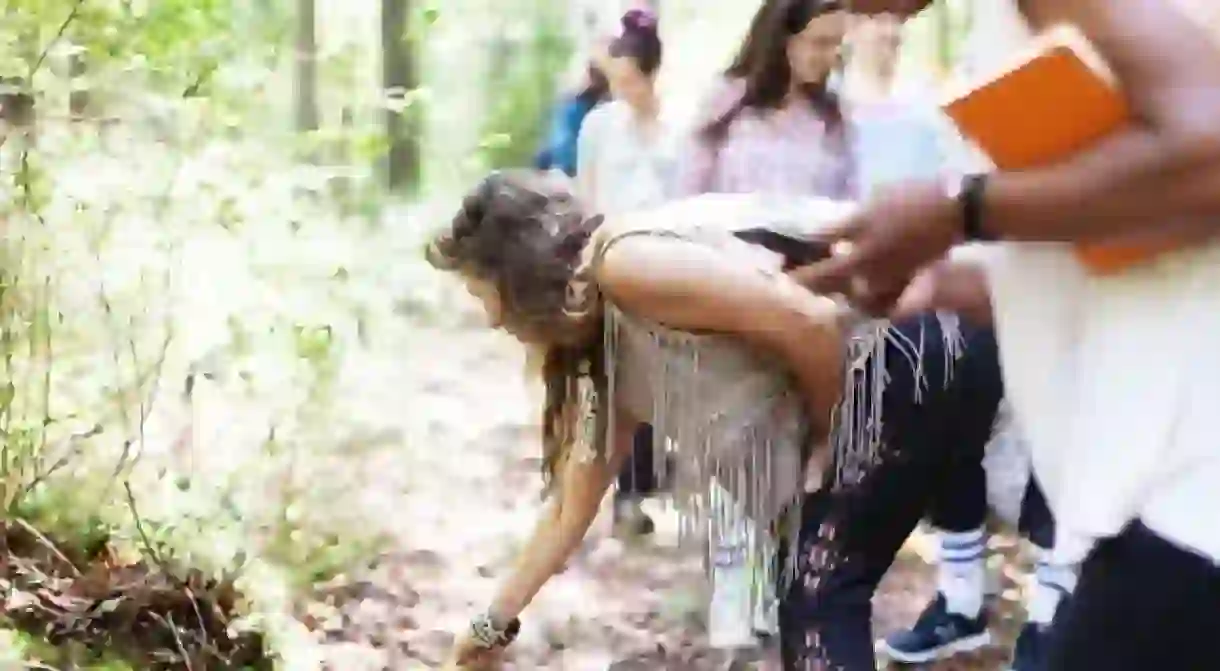Herbalism School Will Teach You All About Brooklyn's Healing Plants

Herbalist Vanessa Chakour teaches Brooklynites how to harness the healing properties of the plants growing in their borough.
If ever you’ve rubbed a soothing yellow dock leaf on a nettle sting or drunk a cup of bedtime tea, you already know a little something about plant medicine. What you probably aren’t aware of, though, is just how many healing plants are literally growing on your doorstep. Even the inconspicuous weeds bursting through cracks in the sidewalk have their uses.
“I am a big advocate for so-called ‘invasive plants’, because a lot of the plants that we consider weeds are some of our most powerful medicines,” Vanessa Chakour says, sipping one of her freshly steeped herbal infusions—a pale yellow, slightly sweet liquid made from Linden flowers. “[So-called weeds] were brought here for a purpose, and I think it’s tragic for the plants and for us not to know that […] We need to shift our perspective entirely and become educated.”
Chakour is facilitating the education process with her Herbalism School, hosted at holistic health space Love is Juniper, and her regular Plant Medicine Walks in Prospect Park. Both are opportunities for urbanites to become more attuned to their environment and the way it influences their minds and bodies.
“I’ll give people a plant to [examine, ingest], and intuit the language of, and I’ll interpret people’s experiences,” Chakour says. “So I’ll have them describe their experience and afterwards I’ll tell them what it’s traditionally used for, and it just really validates the fact that particular plants have a particular effect.”

Plant medicine is something our ancestors relied on, no matter where they were from. The fact that herbalism has experienced a resurgence recently, with adaptogenic supplements (powders composed of plants with subtle healing properties) becoming smoothie staples, illustrates our desire to reconnect to that knowledge.
Besides subtly bolstering health, dabbling in plant medicine also has unexpected benefits in terms of self-knowledge. For Chakour, harvesting, preparing, and ingesting species of plants is an empowering exercise in autonomy: “It’s a practice of feeling connected to myself and the earth and depending on myself to make my own medicine. I’m not as much of a consumer as I used to be, and I’m not looking outside myself for what I need.”
If you’re curious about the natural medicine that’s growing all around you, Chakour suggests looking out for the following plants and weeds, which can be found in the parks and on the streets of Brooklyn:
Mugwort
A bitter plant that’s great for digestion, calms the nervous system and releases tension. Mugwort is also associated with visions and lucid dreaming. Drink it as a tea before bed or burn it like a smudge.
Cleavers
A cleavers is a sticky plant that’s great for cleansing and flushing out the kidneys and lymphatic system. It’s part of the coffee family, so you can roast the seeds and turn them into a hot, lightly caffeinated drink.

Lambs Quarters
A wild edible that’s more nutritious than spinach. Add lambs quarters to your usual salad base for extra vitamins and minerals.
Rose
Rose is an astringent, which makes it great for increasing internal strength and elasticity. It’s also thought to be good at increasing circulation and balancing hormones. Create a rose tincture by steeping the flowers, leaves, stem, and thorns in alcohol for six weeks or more.
Burdock
Calming for adrenals, burdock helps to ground, relax and stop the ‘fight or flight’ response. Make a tincture from the fresh root, or use it in your cooking.













